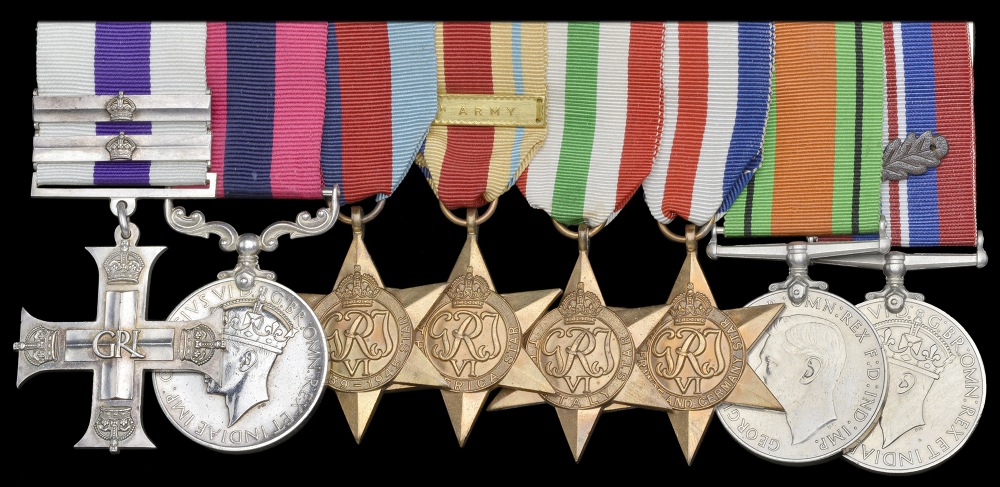Article

21 November 2013
A unique group of gallantry awards won by one of the great heroes of Field Marshal Montgomery’s victorious Eighth Army during the Second World War will be auctioned by Dix Noonan Webb in London on Thursday, 12 December 2013. Jack Tirrell, who began life in the Army as a 17-year-old trumpeter and retired as a Lieutenant-Colonel, won the Military Cross three times and and the Distinguished Conduct Medal once as he constantly risked his life during some of the most important battles of the 1939-45 conflict.
“Tirrell was an inspirational leader whose gallantry left both his comrades and his enemies open-mouthed with admiration and there is no doubt that he contributed greatly to victories such as El Alamein,” said DNW medals specialist David Erskine-Hill. He expects the awards to fetch £40,000 to £50,000.
Thomas Joseph Tirrell, always known as Jack, was born in Yorkshire in 1909 and joined the Royal Horse Artillery as a trumpeter when he was just 17. His abilities were soon recognized and by the outbreak of the Second World War he was a Warrant Officer Class 2, the second most senior rank below officer.
As the German Blitzkrieg swept through France in 1940, Tirrell, serving with ‘L’ Troop, Royal Horse Artillery, showed extraordinary courage in a battle on the Mont Des Cats on 29 May. As they came under attack from German tanks and infantry and Stuka dive-bombers, a survivor recalled that “the Battery Sergeant-Major, Tirrell, was coolly and determinedly indicating with his right arm and pointing out targets.” After all the men in his troop were wounded, Tirrell got on the gun himself and continued to fire.
Eventually the British artillerymen were forced to destroy their own guns to prevent their capture and retreated to Dunkirk. Tirrell was awarded the Distinguished Conduct Medal and commissioned as an officer.
But it was in North Africa, serving with Montgomery’s Eighth Army, that Tirrell won his greatest renown, being awarded two MCs in six months for bravery under murderous fire. At El Tamar on 2 June 1942, Tirrell’s Royal Horse Artillery battery was being overrun by 80 German Panzers when he placed his own Honey tank, which he used as an Observation Post, between his guns and the enemy, enabling some of them to escape. He was awarded his first Military Cross, the citation stating that his “gallant action undoubtedly saved the guns from being overrun by the enemy”.
A Bar to his MC followed for Montgomery’s great victory at El Alamein in October- November 1942. On the first night of the battle he rescued a number of wounded, piling them onto his tank and driving out through a minefield. He also carried out extremely risky observation work which resulted in the destruction of many enemy anti-tank guns and enabled the Allied forces to capture a number of important positions. The citation for the Bar to his MC revealed the important role he had played at El Alamein: “Captain Tirrell’s work has been beyond all praise and has very materially contributed to the present victory.”
Tirrell’s war was not yet over. He saw further action in Tunisia before embarking for Italy where his Royal Horse Artillery unit saw heavy fighting. Transferred to the 3rd RHA, part of the famous 7th Armoured Division (the "Desert Rats"), he went onto North-West Europe, where he won a rare Second Bar to his MC during the advance through the Low Countries in January 1945. A German counter-attack at Susteren in Holland was stopped by heavy artillery fire directed by Tirrell, and prisoners said later that almost all the attacking force was killed or wounded. The recommendation for his third MC said that “the magnificent example” set by Tirrell “will never be forgotten by those who wtitnessed it”.
Tirrell stayed in the Army after the war, serving in Germany and Hong Kong and spending some time attached to the Arab Legion in Jordan before retiring as a Lieutenant-Colonel. His last posting was to Kinmel Camp, near Rhyl in North Wales and he stayed in the area after he left the Army. A married man with two daughters, he was a keen horseman and in retirement established the Cambrian Horse Society, which he ran for 20 years. He died in 1995.
Tirrell was quiet, modest and self-reliant, a genuine hero who preferred not to talk about the fact that he was the kind of man who changes the course of wars. His medals are being sold by a private collector.
Additional Links
The following links are related to this article:
Share This Page